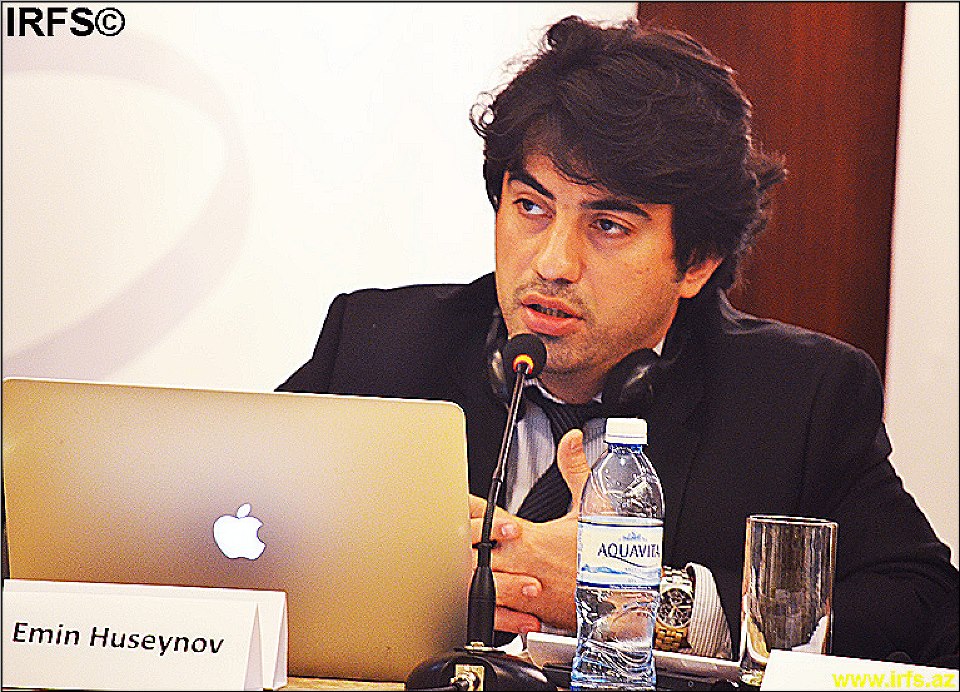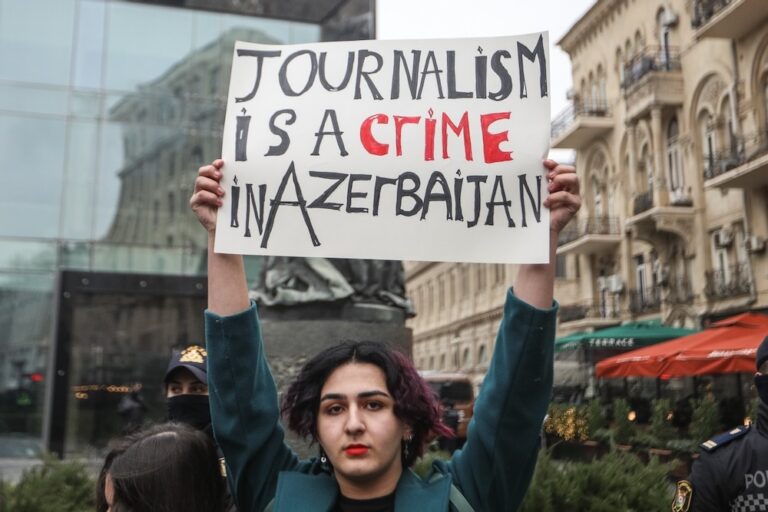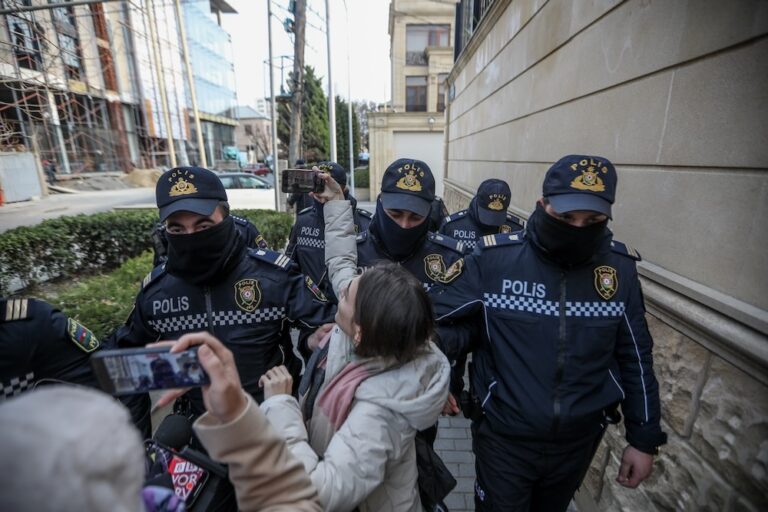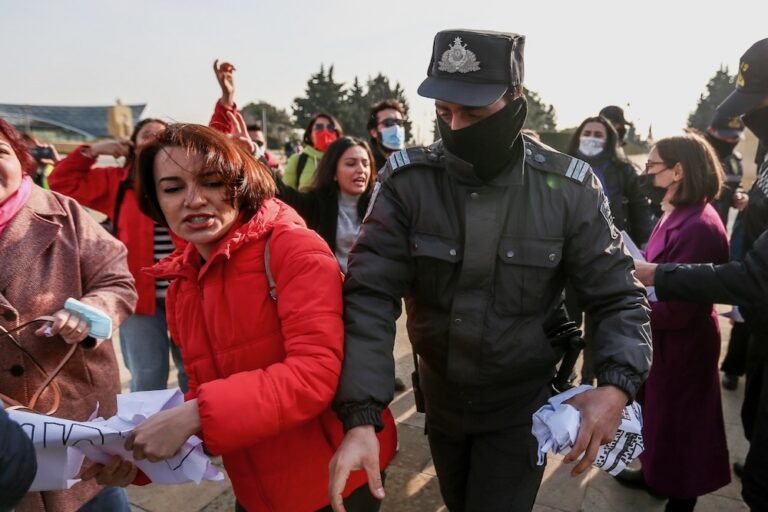Civil society groups call for an end to repression of IFEX member the Institute for Reporters’ Freedom and Safety, and urge UNESCO to take action to ensure free expression in Azerbaijan.
29 September 2014
TO: Ms. Irina Bokova UNESCO Director-General
7, place de Fontenoy 75352 Paris 07 SP France
1, rue Miollis 75732 Paris Cedex 15 France
Email: i.bokova@unesco.org
CC: Mr. Baudelaire Ndong Ella, President of the United Nations Human Rights Council
Ms. Dunja Mijatović, OSCE Representative on Freedom of the Media
Mr. Nils Muižnieks, Council of Europe Commissioner for Human Rights
Civil society groups call on UNESCO to stop free expression crackdown in Azerbaijan
Dear Ms. Bokova,
We, the members of IFEX, the global network defending and promoting free expression, condemn in the strongest possible terms the frantic clampdown on free expression in Azerbaijan, including a deliberate, abusive strategy to silence IFEX member organisation the Institute for Reporters’ Freedom and Safety (IRFS).
Freedom of expression is at the heart of the escalating repression directed at non-governmental organisations (NGOs), civil society activists, human rights defenders and journalists in the recent months.
On 8 August 2014, the IRFS offices were searched; all of the organisation’s material and equipment was seized, and their doors were sealed by the Prosecutor’s Office. IRFS leader and prominent human rights defender Emin Huseynov was forced into hiding and is in need of urgent protection. Huseynov faces imminent arrest on bogus charges of abuse of authority, illegal entrepreneurship and tax evasion. Other IRFS staff members have also been subject to interrogations and illegal travel bans. On 9 July, IRFS bank accounts were put under arrest, paralysing the work of Azerbaijan’s primary media watchdog organisation.
IRFS’ broad freedom of expression approach and its ability to respond rapidly to even the most outrageous actions against press freedom have been the DNA of the organisation’s work since its establishment in 2006.
Another active media rights organisation, the Media Rights Institute, has been subject to the same pressure and was forced to close down. On 5 and 8 August 2014, two more prominent human rights defenders, Intigam Aliyev, the chair of the Legal Education Society, and Rasul Jafarov, the chair of the Human Rights Club, were remanded with 3-month pre-trial detentions under the same charges faced by Emin Huseynov. More than 20 critical human rights NGOs are subject to tax inspections, frozen bank accounts, searches and de facto closures.
We notice with deep concern that the freedom of expression situation has been greatly deteriorating in the last few years. Independent media barely exists in Azerbaijan. We witness an increasing number of imprisoned journalists, bloggers and social media activists on bogus charges such as hooliganism, drug possession, weapon possession and tax evasion. Currently, 9 journalists and 2 bloggers are behind bars on what international and local human rights organizations consider to be bogus charges for their criticism:
- Avaz Zeynalli, editor-in-chief, Khural newspaper
- Hilal Mammadov, editor-in-chief, Tolishy Sado newspaper
- Nijat Aliyev, editor-in-chief, azadxeber.az
- Araz Guliyev, editor, religious website www.xeber44.com
- Tofig Yagublu, journalist, Yeni Musavat newspaper Serdar Alibayli, editor-in-chief, Note Bone
- Parviz Hashimli, editor of moderator.az website and correspondent of Bizim Yol newspaper
- Rashad Ramazanov, blogger
- Rauf Mirkadirov, political commentator of Zerkalo newspaper
- Seymur Hazi, reporter for the newspaper Azadliq
- Omar Mammadov, blogger
Other journalists are subject to psychological pressure, harassment and smear campaigns.
A few select media outlets have been subject to heavy financial pressure that paralyses their work. In June 2014, the Russian-language Zerkalo (Mirror) newspaper was forced to stop publishing due to financial pressure. Another independent newspaper, Azadliq, has also been forced to suspend publishing.
Such targeted repression only confirms the growing tendency to silence and eliminate all critical voices in Azerbaijan. This repressive persecution has had a severe ripple effect, compelling a number of well-known activists to flee the country or go into hiding.
We believe it is prime time for UNESCO to place the critical situation of freedom of expression in Azerbaijan at the forefront of its dialogue with the country’s government, given its strong commitment to “further universal respect for justice, for the rule of law and for the human rights and fundamental freedoms which are affirmed for the peoples of the world, without distinction of race, sex, language or religion, by the Charter of the United Nations”, as mentioned in Article 1 of the UNESCO Constitution.
We strongly urge UNESCO to take immediate steps to prioritise freedom of expression and press freedom in Azerbaijan, both publicly and privately, and refrain from giving unmerited praise to the country, which blatantly ignores its human rights obligations. Improving the situation, including the immediate release of journalists, human rights defenders and NGO leaders, should be a primary condition for Azerbaijan’s effective cooperation with UNESCO. If it remains ignored, UNESCO should stop its cooperation with the Azerbaijani government. Otherwise, UNESCO undermines its own declared values such as freedom of expression, press freedom, independence and pluralism of the media, or democracy, peace and tolerance, recognized by UNESCO as “an essential condition for democracy, development and human dignity”.
Given the extremely grave situation of freedom of expression in Azerbaijan, it is pressing to take immediate action, to communicate with the government regarding this sphere and put the following demands forward to the government:
- Release all journalists imprisoned in connection with their work immediately and unconditionally
- Stop pressures against IRFS and rescind the criminal case opened against the organisation
- Put an end to the practice of intimidating journalists
- Reconsider media laws and adopt legislation, in line with international standards on defamation, that decriminalises defamation and provides civil remedies that are proportionate to the actual harm caused
- Stop applying financial sanctions on newspapers in retaliation for their reporting
Signed,
International Federation of Journalists, Asia Pacific



